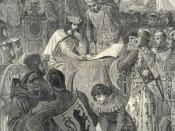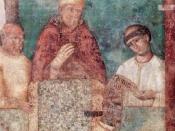Before the High Middle ages, what are now England and France were divided up into many separate fiefdoms. The feudal system evolved in such a way that the king had little power. The vassals pledged their allegiance to their lords and the peasants pledged their allegiance to the vassals, so it was really the lords who had the power. The kings also had no armies of their own and relied on their vassals for support. The church was also a very powerful force due to the immense amount of control it had over people. The church controlled kings by the power of excommunication and by imposing interdicts against their kingdoms if they challenged the Church.
The English kings didn't like the Church's power, but nothing was done about it until William the Conqueror came to power after a large power struggle. Like other kings he granted fiefs to nobles and the Church, but he kept a large piece of land for himself.
He also kept track of what was built where and when. In one of his smartest moves he made vassals swear their allegiance to him before their lords. This way King William had the last say on everything. He also created a census that logged almost every "castle, field, and pigpen in England." This book was called the Domesday Book, because the name implies that no one can escape it. This book enabled William to create a successful system of tax keeping. This set the stage for William's successors to strengthen the two most important aspects of government, finances and law. His successors created an exchequer, or treasury, to collect taxes; but they didn't just collect taxes, they also collected fees, fines, and other forms of income. In 1154 a smart and energetic king, Henry II, came into...


